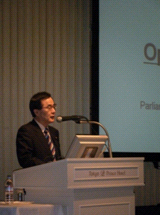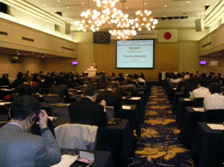Japan-EU Policy Makers Seminar
"The European financial crisis and the future of the European integration"
Tokyo, 5-6 March 2012
March 13, 2012
Japanese
- OVERVIEW –
 |
 |
A one and a half day seminar, organised by the Ministry of Foreign Affairs of Japan, which brought together Japanese officials, representatives from EU institutions (European Commission, European External Action Service, General Secretariat of the Council), representatives from the academic world, diplomatic missions, and the press. In total, more than 200 people attended the seminar. The seminar focused on the impact of the financial crisis on the EU institutional set up and the measures put in place, in particular the recently adopted Treaty on Stability, Coordination and Governance in the Economic and Monetary Union (Fiscal Compact).
Opening Remarks
Parliamentary Vice-Minister for foreign Affairs, Dr. Hamada, and EU Ambassador, H.E. Schweisgut, opened the seminar. Both concurred on the need to focus on growth and economic recovery as well as on the long-term perspective. Noting its importance, Parliamentary Vice Minister Hamada recalled that both Prime Minister Noda and Minister of Foreign Affairs Mr.Gemba had both referred to the Economic Partnership Agreement in recent statements. Parliamentary Vice Minister Hamada also welcomed progress made by Japan and the EU in political areas, such as the assistance to Palestine and antipiracy cooperation.
Keynote Speeches
In their key note speeches, Mr. Cloos, Deputy Director General, General Secretariat of the EU Council, recalled the policy decisions made by the EU, including a strengthened regulatory system as well as a fiscal consolidation package. Mr. Saito, Deputy Director-General, Economic Affairs Bureau, Ministry of Foreign Affairs pointed at the debt crisis in the EU as the greatest risk factor to the world economy. In this light, he explained that the Japan-EU Economic Partnership Agreement would be important for both sides to realize their full economic potential. Finally, Dr. Thygesen, Professor emeritus of the University of Copenhagen , presented an academic analysis which justified the measures taken by the EU and conveyed an optimistic view on the economic gains resulting from the introduction of the euro.
Panel Discussion 1 "Measures taken to the European Financial Crisis"
Dr. Thygessen referred to the vicious circle created by the sovereign debt crisis and the financial crisis, and presented the cases of Greece, Portugal and Ireland. Fiscal consolidation and fiscal reform were needed as well as a reform of the labour markets, in particular in Spain and Italy. Mr. Lannoo (CEO of the Centre for European Policy Studies), presented the EU as an existing multi-centric reality which has adapted to different circumstances in different ways. Given the number of policy areas within the EU a break-up of the euro would have an undesired domino-effect. Finally Mr. Hasegawa (Chief Market Economist – Mizuho Research Institute) presented a rather grim picture. His macroeconomic analysis concluded that the markets had lost confidence in Greece and elaborated on the problems of the euro as a single currency and the inability of the European Central Bank to finance the debt crisis.
Panel Discussion 2 "Future of the European Integration in the light of the Financial Crisis"
The second session allowed Mr. Cloos to elaborate on the historical background of the EU. He stressed that further EU integration was the best and only way to remain a relevant global player. The crisis had served as a catalyst to work on the Economic Union. Dr. Reiterer (Senior advisor for Asia Pacific Affairs - EEAS), recalled that only economics without politics were not an option for the EU and gave details of EU-Asia relations. The EU and Japan must work with both a trade agreement and a comprehensive framework. Ambassador Maruyama (Head of the Political Section in the Mission of Japan to the EU) assessed the political impact of the financial crisis, especially on CFSP, and role of the Lisbon Treaty for formulating an EU response to the crisis. He also analyzed how to strengthen Japan-EU relations under the current circumstance by stressing the importance of a Economic Partnership Agreement and a binding cooperation agreement covering political, global, and other sectoral cooperation.
Panel Discussion 3 "Unification of Competence in Fiscal Policy and the Lisbon Treaty"
The third and final session allowed Mr. Cloos to elaborate on the genesis of the Fiscal Compact, which responded to the demands of some EU Member States to entrust fiscal consolidation rules in EU primary legislation. Dr. Bekx, Director of International Economic and Financial Relations and Global Governance, European Commission, gave further details on the content and impact of the Fiscal Compact. He stressed its importance as a political signal but he believed that it added very little to the legislative proposals prepared by the Commission to strengthen the Stability and Growth Pact and already adopted by the Council (Six Pact). He also stressed that economic growth should not be abandoned and recalled the Europe 2020 initiative, which aims at raising potential growth through structural and efficient reforms in the EU. Professor Morishita, Sofia University Law School, presented a thorough analysis of the Fiscal Compact. He concentrated on issues such as the legal nature of the new Treaty, its relationship with existing EU law, the role of EU institutions in relation to the provisions of the Treaty, in particular the role of the European Commission, the issue of sanctions and how to bring non-compliers to the Court of Justice. Professor Morishita concluded that the political will of the contracting States was more important than any legal considerations. During the final discussion, both Mr. Cloos and Dr. Bekx denied the possibility of an exit mechanism for the euro. They also agreed on the idea that the time was not ripe for the introduction of eurobonds.
CONCLUSIONS
In his concluding remarks, Mr. Isaka, Deputy Director-General, European Affairs Bureau, Ministry of Foreign Affairs of Japan, assessed positively the results of the seminar and thanked all participants for their efforts and the ideas brought forward.
The seminar served as a good platform for the Japanese participants to understand the scope of the measures taken by the EU in the past months in order to overcome the crisis and to reflect on important milestones in the European integration process. The seminar stressed the need to look at the long term perspective. The idea that the crisis would help the EU to overcome structural deficiencies and come out of it stronger was repeated in many occasions. EU participants elaborated on the complex nature of the EU and its many competences, which are dealt with in different ways despite a single legal personality. The institutional innovations of the Treaty of Lisbon were commended both by Japanese and EU officials.
As for the Japan-EU relationship, the importance of both economic and political relations was stressed, and in this context, the need of an Economic Partnership Agreement and a binding agreement, covering political, global and other sectoral cooperation was reconfirmed by participants.
Back to Index
